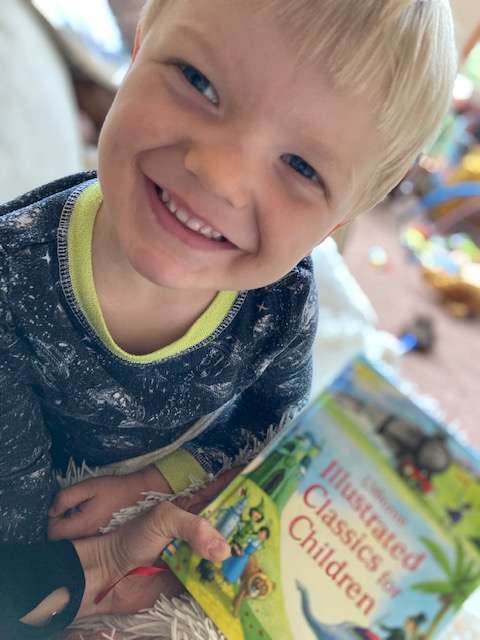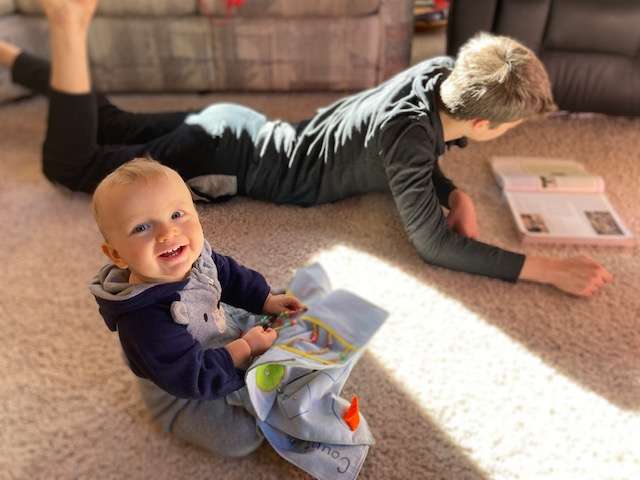4 Reasons to Ditch Multi-Tasking in Your Homeschool for Good
4 Reasons to Ditch Multi-Tasking in Your Homeschool for Good ~
Written by Kari Patterson of Sacred Mundane
It was actually a diet book, more than 8 years ago, that helped me see “bad days” as helpful data. Of course objectivity is tricky in the moment, when tears are flowing or a conversation’s gone sideways or general overwhelm is sweeping through your homeschool day. But now it’s often my son Dutch, the one with Asperger’s, who will help me remember:
This day is giving me data.
Prefer to listen instead?
Sure, just one day might not give you enough data to justify a major change, but when enough of those points line up and the trend is clear, it’s time to take action. For us? I discovered that all of our “bad days” carried a common denominator:
Mama multi-tasking.
Of course I’ve “learned” this before, during our Experiment Year, but wouldn’t you know it: Like our kids, we often need a refresher course.
Now maybe you’ve already learned this, but if you’re at all like me you might be thinking, “Sure, she can’t multi-task. But I can. And I have to multi-task because I have to juggle ________ all at the same time.”
I have no doubt you are more capable than me and you do have more to juggle than I do, but please: Hear me out.
4 Reasons to Ditch Multi-Tasking for Good
1. It doesn’t work.
We think it does. We persist in thinking it does. We convince ourselves it does. But it doesn’t. In fact, it’s unfortunate that we use that word because it’s misleading. Originally it was used to describe the function of computers: Multiple tasks being performed alternately on the same machine. Now, we use it to describe humans doing multiple tasks simultaneously.
But even computers only process one piece of code at a time, switching back and forth, alternating its attention until a task is done. The speed at which they do this causes us to believe it’s all happening at once.
Similarly, we would do well to call multi-tasking what it really is: Switching-back-and-forth-between-a-bunch-of-tasks-without-really-focusing-on-any-of-them. But that doesn’t sound nearly as neat! The reality is that we’re “task switching” and it’s proven that tasks take more time when performed this way.
Researcher Dr. David Meyer estimates that it makes simple tasks take 25 percent longer, and complicated tasks over 100 percent longer. In short: It doesn’t work.
2. It erodes our ability to pay attention.
As every Charlotte Mason enthusiast knows, learning the habit of attention as a child is critical preparation for academic achievement. She calls this habit, “The act by which the whole mental force is applied to the subject in hand.”
This takes practice. We must be trained to pay attention well. Resources are available for teaching young ones to build an attention span, but how can we instill in our children something we aren’t developing ourselves?
And yet, it remains a crucial component of their education. Mason writes,
The highest intellectual gifts depend for their value upon the measure in which their owner has cultivated the habit of attention. To explain why this habit is of such supreme importance, we must consider the operation of one or two of the laws of thought. But just recall, in the meantime, the fixity of attention with which the trained professional man — the lawyer, the doctor, the man of letters — listens to a roundabout story, throws out the padding, seizes the facts, sees the bearing of every circumstance, and puts the case with new clearness and method; and contrast this with the wandering eye and random replies of the uneducated; — and you see that to differentiate people according to their power of attention is to employ a legitimate test. (Vol. 1, p. 137)
3. It produces shallow work.
In his book Deep Work, Cal Newport asserts that the two core abilities necessary for thriving in this new economy are:
- The ability to quickly master hard things.
- The ability to produce at an elite level, in terms of both quality and speed.
He demonstrates that in order to do these things, to produce what he calls “deep work, ” one must ruthlessly eliminate distraction and all forms of multi-tasking.
He advocates embracing boredom and scheduling long periods of time for deep thinking and focused work. He cites the habits of JK Rowling and Bill Gates, Mark Twain and Woody Allen, demonstrating how devoted they are to distraction-free environments in order to produce the highest quality work.
Sure, I may not be working on a great American novel, but isn’t the work of educating our children of highest importance? If so-called multi-tasking takes longer and produces poor-quality results, certainly it isn’t the best way to do school.
4. It robs joy.
I share this last but honestly, it’s the real reason I’ve tried to ditch multi-tasking for good. If I’m honest, trying to give my attention to many things at once is a sure-fire way to enjoy none of them.

When I’m trying to do many things at once, how often do I smile? How often do I look deeply into the eyes of my child when my mind is a million miles away on other things? The truth is, I’m more impatient, quicker to bark out orders or sigh in exasperation or speak in a harsh tone, when I’m doing more than one thing at a time.
In fact, even challenges become invaluable teachable moments when I’m engaged enough to see the opportunity at hand.
I want my children to remember a mom who smiled. I want them to remember a mom who listened. Who laughed. Who sat down right beside them to look at math problems together. A mama who was present.
That’s nice, Kari, but how?
I get it. I have a high-schooler, a middle-schooler, a preschooler, and an infant. Add housework, meals, outside relationships, and my other work, and this feels downright impossible.
For me, it means making my Not To Do List. It means trying to teach my little ones to play independently. It means silencing my phone. It means meal-planning. It means sometimes saying no.
I know each of our lives are unique, but I dare you to ditch multi-tasking as much as you can, and see whether it might just make the difference in your day. It definitely does in mine. Thanks for reading.
What has been your experience with multi-tasking?
What’s Your Homeschool Mom Personality? Take Jamie’s quiz now and receive a free personality report to help you organize your homeschool based on what your personality type needs most!



Nailed it. I only get snappy when I’m trying to do multiple tasks at once. Thank you for the reminder!
This article blessed me. Thank you.
Oh my this is my heart! I am this multi tasker! I hate. I have adopted two children. One boy one girl, both 6 at this time! Home schooling, but need more smiles!
This speaks to me! I am using Thanksgiving break to reevaluate our life at home, and I think this is a big part of what is wrong. Thanks